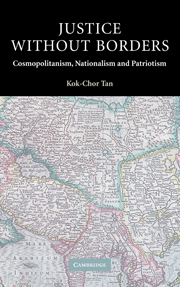4 - Liberalism and cosmopolitan justice
Published online by Cambridge University Press: 22 September 2009
Summary
Taking their inspiration from John Rawls's A Theory of Justice, liberals like Charles Beitz and Thomas Pogge have argued that Rawls's arguments for social and economic equality should apply also to the global context (Rawls 1971; Beitz 1999a [1979]; Pogge 1989; 1988a). Just as Rawls considers a person's race, gender, talents, wealth, and other natural and social particularities to be “arbitrary from a moral point of view” (Rawls 1971, p. 15), so too, they argue, are factors like a person's nationality and citizenship morally arbitrary. And as the effects of these contingencies on a person's life chances in the domestic sphere are to be nullified by certain distributive principles of justice, so too should the effects of global contingencies be mitigated by certain global distributive principles. Thus, Rawls's principles of justice – including the second principle governing social and economic equality – should apply between individuals across societies and not just within the borders of a single society.
But in his extended commentary on international relations, Rawls explicitly rejects the concept of global distributive justice. In this chapter, I wish to evaluate Rawls's reasons for rejecting the idea of global distributive justice. An important contrast between Rawls's Law of Peoples and the views of liberals like Beitz and Pogge, as we will see, is that the former is avowedly noncosmopolitan. I will argue, however, that a liberal Law of Peoples ought to endorse the cosmopolitan ideal.
- Type
- Chapter
- Information
- Justice without BordersCosmopolitanism, Nationalism, and Patriotism, pp. 62 - 82Publisher: Cambridge University PressPrint publication year: 2004

